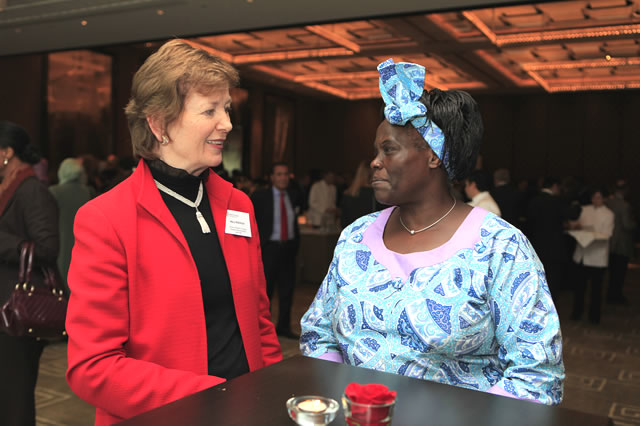President of the Foundation, Mary Robinson and Nobel Peace Prize winner and founder of the Green Belt Movement, Wangari Maathai, highlight in The Huffington Post the importance of women’s leadership in achieving the MDGs and in fighting climate change...
– Mary Robinson and Wangari Maathai in the Huffington Post
Mary Robinson and Nobel Peace Prize winner and founder of the Green Belt Movement, Wangari Maathai highlight in The Huffington Post the importance of women’s leadership in achieving the MDGs and in fighting climate change:
The time has come for women leaders to influence the narrative on climate change and how we address its impacts. The devastating floods in Pakistan illustrate how natural and man-made disasters can in a matter of days wipe out years of development progress. The floods in Pakistan have affected 20 million people — equal to the population of New York state — or nearly two-thirds of Canada. And while Pakistan is ranked among the poorest countries in the world, this tragedy has deepened the desperation of people already struggling to feed families and fend off disease.
Pakistan’s story is, unfortunately, not unique. It is being repeated today in countries around the globe.
Decades of environmental mismanagement, combined with the increasing impacts of climate change, are putting social and economic development efforts at risk. Changing precipitation patterns are skewing traditional seasons and undermining the agricultural rhythms of farmers. More frequent extreme weather events like droughts, hurricanes, floods and cyclones are damaging lives, livelihoods and infrastructure.
From scientists to economists, those studying the phenomena recognize that developing countries, whose economies are already precarious and where so many people, especially women, depend directly on the natural world for food, water and fuel, are being hardest hit. It is poorer households and communities and, in many countries, indigenous groups already pushed to the most marginal lands, who are least able to cope. Progress towards achieving the UN Millennium Development Goals (MDGs) over the past decade is now threatened by environmental risks that undermine the resilience, and deplete the resources, of households and governments alike.
This week world leaders will gather at the United Nations in New York to take stock of progress towards achieving the MDGs over the past decade and agree on ways forward for the final five years to the 2015 targets. What hasn’t been addressed sufficiently in the lead up to the MDG review is the fact that some of the biggest constraints to achieving these global development objectives – the impacts of climate change and other environment-related threats — continue to be routinely sidelined in development policies and practice. Until this changes, there is little hope of permanent gains in many of the areas covered by the MDGs.
Women leaders must insist we address environmental and development challenges in tandem. That means, for example, integrating national MDG and Poverty Reduction Strategies with the national-level climate change adaptation plans of action being put in place in countries around the globe — a process that happens all too infrequently today.
A more coherent approach also requires much greater attention and action to address the particular challenges facing women and girls and their role in advancing sustainable development. In Sub-Saharan Africa and other regions, drought exacerbated by climate change is contributing to chronic crop failures, deforestation and water shortages, with devastating impacts for girls and women. The primary food producers and procurers of water and fuel for cooking are women. Environmental changes are resulting in women being forced to travel farther to secure food, water and fuel for their families. This has been shown to have negative impacts on nutritional levels, educational attainment and work opportunities, to say nothing of quality of life issues overall.
But not only are women bearing the brunt of environmental and development setbacks — they are also a powerful source of hope in tackling climate and other environmental threats, and their voices must be heard. As the success of the Greenbelt Movement in planting millions of trees in Kenya has demonstrated, women can be an extraordinary force for positive change. Their knowledge and experience are fundamental to mitigating the effects as well as adapting to the inevitable changes wrought in local communities by shifting climatic patterns.
The absence of women, particularly those from the global South, from national and international discussions and decision-making on climate change and development must change. The battle to protect the environment is not solely about technological innovation — it is also about empowering women and their communities to hold their governments accountable for results. They can help ensure that other powerful actors such as the private sector act responsibly as well. To make a real difference, women need greater access to the education, resources and new technologies required to help design adaptation to a rapidly changing environment. Climate mitigation and adaptation strategies must be developed with women, not for them, and women must be involved alongside men in every stage of climate and development policy-making.
From the response in Pakistan to the UN Summit in New York, we must now recognize and act on the connections between climate change and development and ensure that women play a central role in shaping climate and environmental planning in the years ahead.


